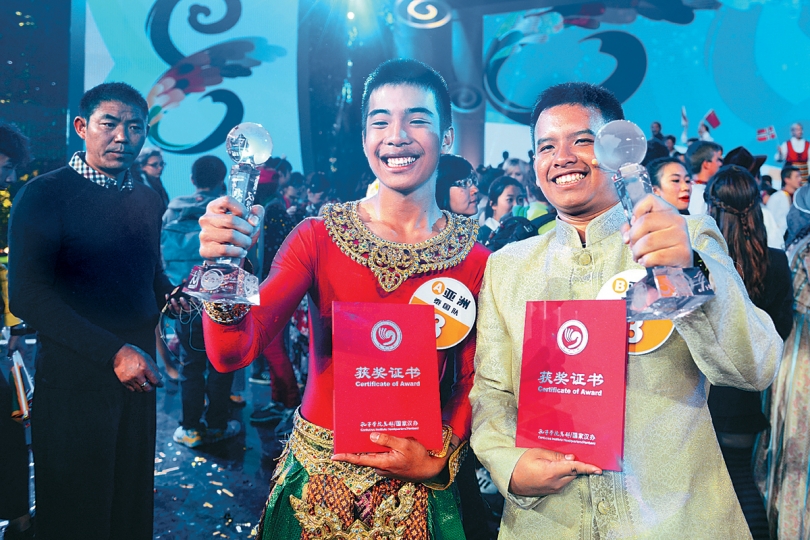Hands across the Yunnan border

Chiang Mai University is at the forefront in meeting Chinese demand for Thai culture
The people of Yunnan in China feel a closer bond to Thailand than ever after a Thai team beat more than 1,400 contestants from 80 other countries to win a Chinese-proficiency competition there in November.
The eighth Chinese Bridge contest for foreign secondary-school students, held over 16 days in Kunming, was an obstacle course in the Chinese language, but Fang Zhuli and Xie Qianxi from Thailand – using their Chinese names – battled their way through every round to win. Their victory had special resonance for the 40th anniversary of the Sino-Thai diplomatic relations. As well, Yunnan is close to Thailand both geographically and culturally and efforts have greatly enhanced educational cooperation.
In 1992 universities in Yunnan began establishing Thai-language departments, and in 2000 Yunnan Nationalities University introduced a “3+1” training model for undergraduates to study in China for three years and in Thailand for one year. In 2014 the Confucius Institute at Chiang Mai University – jointly established by CMU and Yunnan Normal University – was recognised as Confucius Institute of the Year.
With Yunnan serving an increasingly important role in China’s Belt and Road Initiative, the province and Thailand are stepping up educational exchanges. The aim is to produce a large number of high-quality talents with “international vision” to provide intellectual support for the development of Chinese-Thai relations.
The educational collaboration has expanded both in depth and breadth. Both governments have organised forums and promotions to strengthen the exchanges between universities. Scholarships have been set up to encourage students to study abroad.
In addition to traditional courses – language, exchanges and the joint compiling of textbooks – the “2+2” and “3+1” joint-training models are now widely adopted in Yunnan and Thailand.
“I love Chinese – its mellow and full tune, its rhythmic flow of sound – and I love the Chinese culture behind it,” says Peipei, a Thai student studying at Yunnan Normal University. In response to increasing demand, Confucius institutes and Confucius classrooms have been set up across Thailand. These are acting as windows on both the Chinese language and culture as well as bridges between Thailand and China.
In 2014 the Confucius Institute at Chiang Mai University when it was recognised as the best among 500 others in 134 countries. It not only combines the teaching of Chinese language and the interpretation of Chinese culture, but also introduces the Chinese classroom to communities. The institute has organised cultural camps, exhibitions, performances and seminars, inspiring residents to learn the language and understand China better.
Since 1995 Yunnan Normal has sent many teachers to work in Thai universities and primary and secondary schools. Chiang Mai and Yunnan Normal universities established the Thai Language and Cultural Centre at Yunnan. Textbooks on “Chuangzhi Chinese”, compiled by Yunnan Normal, have generated enthusiasm among Thai students in all walks of life. Chiang Mai University has 100 Chinese students studying there every year, 80 per cent of them from Yunnan province.
“There’s a Thai saying that Chinese and Thai people are siblings, while Yunnan and Thai people are more than siblings,” says Ma Chi, a Kunming native who’s been teaching in Chiang Mai for 10 years. In February 2014, she pointed out, Chiang Mai University authorised Yunnan Around Asia Education (YAAE) to run the College of Humanities Examination Training Centres and College of Arts, Media and Technology Examination Training Centres in Yunnan. These centres mainly recruit undergraduate and graduate students studying the Thai language, English cross-cultural communication, software engineering and information-technology management for Chiang Mai University. They also provide exam training and organise entrance examinations.
The Around Asia programme has established cooperative relations with eight secondary schools and an education bureau in Kunming and has recruited nearly 50 students for Chiang Mai University.
RELATED





